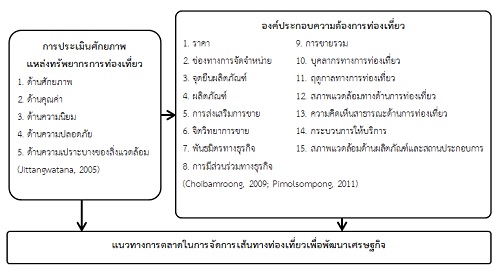MARKETING GUIDELINES FOR TOURISM ROUTE MANAGEMENT FOR ECONOMIC DEVELOPMENT IN THE DISTRICT OF SUNG NOEN, PAK THONG CHAI AND KHON BURI, NAKHON RATCHASIMA PROVINCE
DOI:
https://doi.org/10.14456/nrru-rdi.2023.38Keywords:
Marketing guidelines, Tourism potential, Tourism route management, Economic developmentAbstract
Utilizing local tourism resources effectively through research aimed at studying the potential, demands, routes, and marketing approaches for managing tourism in the areas of Sung Nern District, Pak Thong Chai District, and Khon Buri District, Nakhon Ratchasima Province. Three sample groups were determined, comprising 24 relevant parties in the area, 400 tourists, and 71 local organizations. Surveys, potential assessment forms, questionnaires, and data recording forms were passed quality checks for each issue scoring 0.89, 0.87, 0.89, 0.84, and 0.93, respectively. Data collection was performed through interviews, needs assessments, and conference organization. Data were analyzed using content analysis, descriptive statistics of means, and standard deviations. The findings showed that 1) the overall potential of tourism resources is high ( =3.98, S.D.=0.75), 2) tourists have the highest level of demands for tourism (
=4.21, S.D.=0.76), 3) there are five types of tourism routes: historical, Buddhist, agricultural, ecotourism, and mixed routes, and 4) there are fifteen marketing guidelines for tourism management, consists of; preparing and clearly announcing tourism prices, coordinating and searching distribution channels, creating a position and direction, developing tourism products, exploring financial advertising, creating collaborative learning behaviors; coordinating business collaborations; promoting participation among tourism partners; consolidating tourism products and services; developing tourism personnel; increasing activities to expand tourism opportunities; studying the tourism environment; accepting public opinion; establishing tourism knowledge; developing the internal and external environment. These approaches will lead to the creation of jobs, incomes, investments, marketings, and geographic development in tourist areas.
References
Adom, D. (2019). The place and voice of local people, culture, and traditions: A catalyst for ecotourism development in rural communities in Ghana. Scientific African, 6, e00184. doi:https://doi.org/10.1016/j.sciaf.2019.e00184
Choibamroong, T. (2009). The role of local government organizations in sustainable tourism development based on the concept of sufficiency economy. Bangkok : King Prajadhipok's Institute. (In Thai)
Cochran, W. G. (1977). Sampling Techniques (3rd ed.). New York : John Wiley and Sons.
Jin, X., Wu, H., Zhang, J., & He, G. (2021). Agritourism development in the USA: The strategy of the state of Michigan. Sustainability, 13(20), 11360. https://doi.org/10.3390/su132011360
Jittangwatana, B. (2005). Sustainable Tourism Development. Bangkok : Tourism Authority of Thailand. (In Thai)
Jittangwatana, B. (2005). Tourism industry, the never-ending business of Thailand. Bangkok : Bangkok CP Book Standard. (In Thai)
Kasikorn Research Center. (2019). Trends in the Thai tourism industry in the year 2019 (B.E. 2562). Retrieved August 31, 2020, from https://www.kasikornbank.com/international-business/en/Thailand/IndustryBusiness/Pages/201901_Thailand_TourismOutlook19.aspx (In Thai)
Kerimbergenovich, A. A., Kamilovich, S. S., Tursinbaevich, A. R., Jannazarovich, A. K., Kazievich, S. J., & Maksetovich, O. H. (2020). Ecotourism development in the Republic of Karakalpakstan: historical places and protected areas. Journal of Critical Reviews, 7(12), 1258-1262.
Mai, K. N., Nguyen, P. N. D., & Nguyen, P. T. M. (2019). International tourists’ loyalty to Ho Chi Minh City destination—a mediation analysis of perceived service quality and perceived value. Sustainability, 11(19), 5447. https://doi.org/10.3390/su11195447
Ministry of Sports and Tourism. (2017). Tourism Statistics Report of Thailand for the year 2017 (B.E. 2560). Retrieved March 22, 2018, from https://www.mots.go.th/download/article/article_20190516131031.pdf (In Thai)
Nonthapot, S., & Thomya, W. (2020). The effect of the marketing mix on the demand of Thai and foreign tourists. Management Science Letters, 10(11), 2437-2446. DOI: 10.5267/j.msl.2020.4.006
Pimolsompong, C. (2011). Planning and developing the tourism market (10th ed.). Bangkok : Kasetsart University Press. (In Thai)
Provincial Office of Natural Resources and Environment Nakhon Ratchasima. (2021). 5-Year Government Action Plan (B.E. 2565-2569) for Natural Resources and Environmental Management in Nakhon Ratchasima Province. Retrieved September 20, 2022, from https://korat.mnre.go.th/attachment/iu/download.php?WP=qUIcnKt4pQugZKqCGWOghJstqTgcWat0pQWgZKp2GQAgG2rDqYyc4Uux (In Thai)
Reason, P., & Bradbury, H. (2008). Handbook of action research: Participative inquiry and practice (2nd ed.). London : SAGE.
Siljaru, T. (2010). Research and analysis of statistical data with SPSS (11th ed.). Bangkok : V. Inter Print. (In Thai)
Tang, H., Wang, R., Jin, X., & Zhang, Z. (2022). The Effects of Motivation, Destination Image and Satisfaction on Rural Tourism Tourists’ Willingness to Revisit. Sustainability, 14(19), 11938. https://doi.org/10.3390/su141911938
Tirakanan, S. (2006). The use of statistics in social science research: a practical approach (2nd ed. (revised)). Bangkok : Chulalongkorn University Printing House. (In Thai)
Vada, S., Dupre, K., & Zhang, Y. (2023). Route tourism: a narrative literature review. Current Issues in Tourism, 26(6), 879-889. https://doi.org/10.1080/13683500.2022.2151420
Yang, X. S., & Xu, H. (2022). Producing an ideal village: imagined rurality, tourism and rural gentrification in China. Journal of Rural Studies, 96, 1-10. https://doi.org/10.1016/j.jrurstud.2022.10.005
Zeng, L., & Yi Man Li, R. (2021). Tourist satisfaction, willingness to revisit and recommend, and mountain kangyang tourism spots sustainability: A structural equation modelling approach. Sustainability, 13(19), 10620. https://doi.org/10.3390/su131910620
Zhang, X., Pang, X., Wen, X., Wang, F., Li, C., & Zhu, M. (2023). TriPlan: an interactive visual analytics approach for better tourism route planning. Journal of Visualization, 26(1), 231-248. https://doi.org/10.1007/s12650-022-00861-8
Zhou, Q., Zhu, K., Kang, L., & Dávid, L. D. (2023). Tea Culture Tourism Perception: A Study on the Harmony of Importance and Performance. Sustainability, 15(3), 2838. https://doi.org/10.3390/su15032838

Downloads
Published
How to Cite
Issue
Section
License

This work is licensed under a Creative Commons Attribution-NonCommercial-NoDerivatives 4.0 International License.




